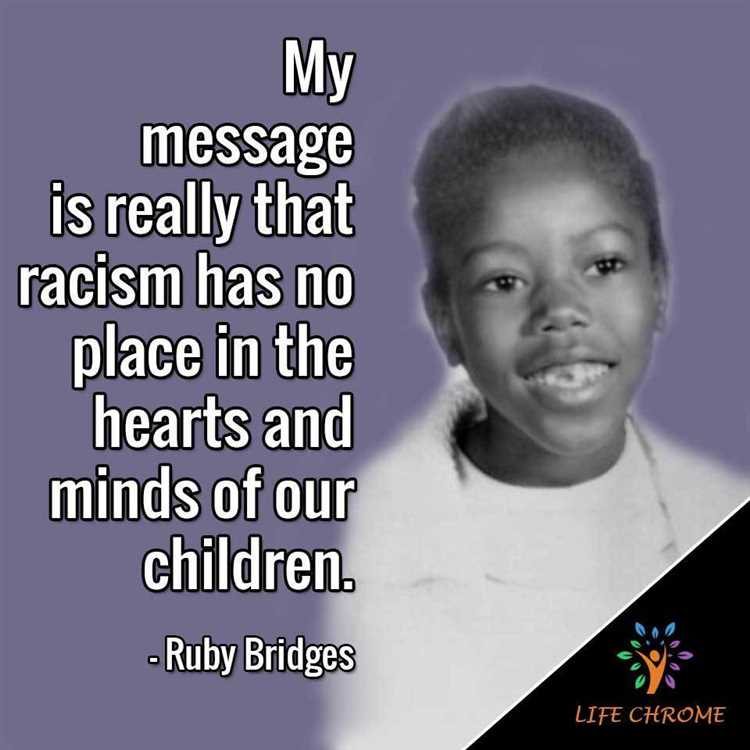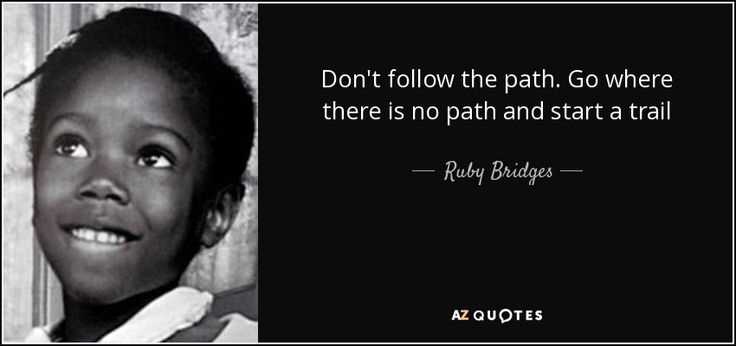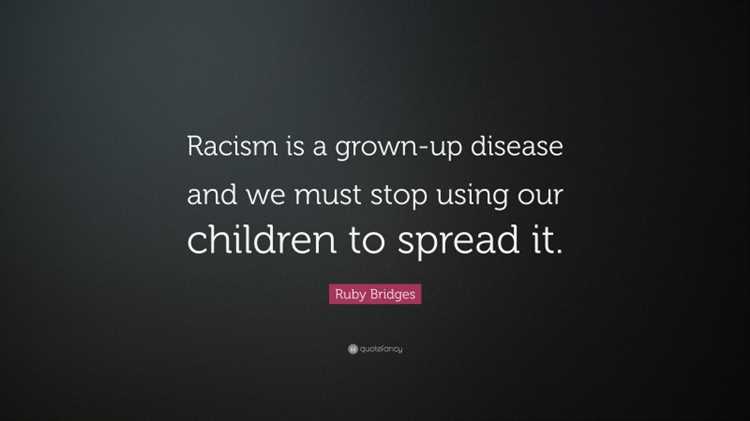Ruby Bridges, an American civil rights activist, is widely known for her bravery and perseverance as the first African-American student to attend an all-white school in the South. Her famous quote, “Racism is a grown-up disease, and we must stop using our children to spread it,” encapsulates the profound message she conveyed throughout her life.
In 1960, at the age of six, Ruby Bridges became a symbol of the fight against racial segregation when she walked through the doors of William Frantz Elementary School in New Orleans. Despite facing daily harassment and protests from white parents who refused to have their children attend school with a black child, Ruby carried herself with remarkable strength and courage.
Ruby’s quote emphasizes the idea that racism is not an inherent quality but a learned behavior. By stating that racism is a “grown-up disease,” she highlights the fact that prejudice and discrimination are cultivated within society and passed down to future generations. This powerful message calls for an end to the perpetuation of racism through the education and enlightenment of children.
The use of the phrase “using our children to spread it” underscores the responsibility adults bear in shaping the beliefs and values of young minds. It challenges society to examine the impact of its actions and the influence it has on molding the attitudes of future generations. Ruby’s quote serves as a reminder that it is the duty of adults to break the cycle of racism and to instead teach tolerance, acceptance, and equality to their children.
“Racism is a grown-up disease, and we must stop using our children to spread it.” – Ruby Bridges
Understanding Ruby Bridges
Ruby Bridges is an American civil rights activist who is best known for being the first African-American child to desegregate an all-white school in the South. Born on September 8, 1954, in Tylertown, Mississippi, Bridges became a symbol of courage and resilience in the face of racial prejudice and discrimination.
At the age of six, Bridges was selected to participate in the 1960 New Orleans school desegregation crisis. She was the only African-American child to attend William Frantz Elementary School, a previously all-white school. Her enrollment sparked anger and protests from white parents and community members who opposed desegregation.
Despite facing numerous threats and harassment, Bridges continued to attend school every day, escorted by federal marshals for her safety. She faced a hostile environment where she was taunted and ostracized by her white classmates and even some teachers. However, Bridges remained determined to receive an education and pave the way for other African-American students.
Her bravery and perseverance inspired not only the African-American community but also people around the world. Bridges’ courageous act played a significant role in the larger civil rights movement, challenging the status quo and demanding equal rights and opportunities for all.
Bridges’ famous quote, “Racism is a grown-up disease, and we must stop using our children to spread it,” reflects her deep understanding of the impact of racism and the importance of education in combating it. She believes that racism is not an inherent trait but something that is learned and perpetuated. By educating children about the harmful effects of racism, Bridges hopes to break the cycle and create a more inclusive and equitable society.
Ruby Bridges’ story serves as a powerful reminder of the courage, resilience, and determination of individuals who have fought for equal rights and social justice. Her legacy continues to inspire generations to work towards creating a more inclusive and fair society for all.
An Iconic Quote
One of the most iconic quotes from Ruby Bridges is, “”Don’t follow the path. Go where there is no path and begin the trail.” This powerful message encapsulates Ruby’s courageous journey as the first Black student to integrate an all-white school in New Orleans in 1960.
Ruby’s quote serves as an inspiration to all those who face adversity and challenges in their lives. It encourages individuals to be independent thinkers, to blaze their own trail, and to not be afraid to step outside of the established norms and expectations.
By not following the path, Ruby Bridges exemplified bravery and resilience. Despite facing hatred and racism from the white community, she did not let fear stop her from pursuing an education. Her determination to receive the same educational opportunities as her white peers empowered her and became a symbol of the Civil Rights Movement.
Ruby’s quote also highlights the importance of taking risks and embracing the unknown. Going where there is no path requires stepping into uncharted territory, facing uncertainty, and challenging the status quo. It urges individuals to be agents of change and to create their own path, regardless of the obstacles they may encounter.
Furthermore, Ruby’s quote emphasizes the power of individual actions and their ability to inspire others. By being the first to integrate an all-white school, Ruby broke down barriers and paved the way for future generations of Black students. Her courage and determination encouraged others to stand up for their rights and fight against systemic racism.
In conclusion, Ruby Bridges’ quote, “Don’t follow the path. Go where there is no path and begin the trail,” is a powerful message that encourages individuals to be brave, independent, and trailblazers. It reminds us of Ruby’s extraordinary journey and the impact she had on the Civil Rights Movement. Her story serves as a reminder that we have the power to create change and overcome adversity, no matter how daunting the challenges may be.
Ruby Bridges’ Famous Quote
Ruby Bridges, an African American civil rights activist, is known for being the first African American child to attend an all-white elementary school in the South. Her famous quote, “Racism is a grown-up disease, and we must stop using our children to spread it,” carries a powerful message and a call to action.
In the context of the civil rights movement in the 1960s, Ruby Bridges’ quote highlights the damaging impact of racism on society and the importance of breaking the cycle of hate and prejudice. By referring to racism as a “grown-up disease,” she emphasizes that racism is not an inherent trait but a learned behavior that can be unlearned.
The quote also addresses the role of children in combating racism. Ruby Bridges stresses that children should not be used as instruments for spreading racism. Children are often influenced by the beliefs and behaviors of adults, and by educating children to be accepting, inclusive, and empathetic, we can create a future generation that rejects racism.
Ruby Bridges’ experience of being escorted to school every day by federal marshals due to threats and violent protests demonstrates the courage and resilience required to challenge the status quo. Her quote encourages individuals to stand up against racism, not just during the civil rights movement, but in everyday life.
The quote’s message extends beyond the issue of racial discrimination and can be applied to any form of prejudice or discrimination. It reminds us that hate and prejudice are learned behaviors that can be unlearned, and it is our responsibility to break the cycle.
In summary, Ruby Bridges’ famous quote serves as a reminder of the destructive nature of racism and the importance of teaching children to reject prejudice. By breaking the cycle of hate, we can create a more inclusive and accepting society.
The Power of Words
Ruby Bridges’ famous quote, “Racism is a grown-up disease and we must stop using our children to spread it,” encapsulates the power of words to perpetuate or dismantle prejudice and discrimination.
Words have the ability to shape our beliefs, attitudes, and actions. They can inspire change, unity, and empathy, or they can fuel hatred, division, and injustice. When used with intention and purpose, words can be a powerful force for driving social progress and challenging oppressive systems.
Ruby Bridges, as a six-year-old African American girl, became a symbol of the Civil Rights Movement when she integrated an all-white school in New Orleans in 1960. Her courageous act not only challenged the status quo but also sparked conversations and debates about racial equality and justice. Her words, spoken years later, continue to resonate and inspire generations to confront and combat racism.
One of the key aspects of the power of words is their ability to influence perspectives and shape narratives. When people in positions of power and influence use their words to perpetuate stereotypes or promote discrimination, the consequences can be far-reaching. However, when individuals use their words to challenge prejudices, educate others, and advocate for equality, they can create a ripple effect of positive change.
The power of words can also be seen in the way they can uplift and empower marginalized communities. By sharing stories, experiences, and perspectives through spoken or written word, individuals from marginalized backgrounds can challenge mainstream narratives and reclaim their voices. This can lead to a greater understanding, empathy, and support for these communities, ultimately contributing to a more inclusive and equitable society.
Words alone, however, are not enough. Actions must accompany words for true change to happen. The power of words lies in their ability to inspire action and mobilize individuals and communities towards a common goal. They can serve as a catalyst for social movements, ignite passion and determination, and galvanize people into taking steps towards dismantling oppressive systems and creating a more just society.
In conclusion, the power of words cannot be underestimated. From Ruby Bridges’ famous quote to the speeches of civil rights leaders, words have the capacity to shape our beliefs, challenge prejudices, and inspire action. It is our responsibility as individuals to use our words wisely, to listen and learn from others, and to actively work towards creating a world where everyone is valued and treated with dignity and respect.
Inspiration and Hope
Ruby Bridges’ famous quote is not just a collection of words, but a powerful message that encompasses inspiration and hope. These two elements are closely intertwined, as inspiration often leads to hope, and hope fuels inspiration.
When Ruby Bridges said, “Racism is a grown-up disease and we must stop using our children to spread it,” she inspired millions of people around the world. Her words resonated with those who believe in equality and justice, igniting a flame of hope for a better future.
Her message of stopping the spread of racism through children emphasizes the importance of education and empathy. It reminds us that children are not born with prejudice; they learn it from those around them. By teaching our children inclusivity and acceptance, we can create a generation that is free from the shackles of racism.
Furthermore, Ruby Bridges’ quote is a reminder that change starts with individuals. It encourages each person to take responsibility for their actions and the impact they have on others. By examining our own biases and working towards a more tolerant society, we can be the catalysts for positive change.
The quote also inspires hope by reminding us that progress is possible. Ruby Bridges, as a six-year-old African-American girl, bravely faced adversity and became a symbol for civil rights. Her story represents the triumph of courage and perseverance over discrimination and fear. It gives hope that even in the face of overwhelming obstacles, individuals can make a difference.
Ruby Bridges’ message has inspired countless individuals to take action, whether it be in their personal lives or within their communities. It serves as a reminder that change is not only necessary but achievable. Through education, empathy, and individual action, we can create a future where racism is eradicated and equality prevails.
The Impact of Her Message
Ruby Bridges’ famous quote has had a lasting impact on society, serving as a powerful reminder of the importance of equality, courage, and the fight against discrimination.
- Inspiring Courage: Her message serves as an inspiration to individuals of all ages, reminding them that with courage and determination, they can overcome even the most difficult obstacles.
- Encouraging Equality: By speaking out against racism and segregation, Ruby Bridges’ quote promotes the idea that everyone, regardless of race, should be treated equally. It encourages individuals to question and challenge discriminatory practices.
- Advocating for Education: Through her message, Ruby Bridges emphasizes the importance of education and the right of all children to access quality education, regardless of their background. She highlights the transformative power of education in breaking down barriers and creating a more inclusive society.
- Empowering Future Generations: Her message continues to empower and inspire future generations to stand up against injustice and work towards a more equal and inclusive society. It reminds individuals that even as individuals, they have the power to make a difference.
In conclusion, Ruby Bridges’ famous quote has had a profound impact on society by inspiring courage, promoting equality, advocating for education, and empowering future generations. Her message serves as a timeless reminder of the importance of fighting against discrimination and injustice.
Creating Change
To create change, it is necessary to take action and push back against the status quo. Ruby Bridges’ famous quote, “Don’t follow the path, create your own,” embodies this idea. By refusing to be defined by the limitations imposed by society, Bridges was able to make a significant impact on the Civil Rights Movement.
Taking a Stand:
Ruby Bridges’ courageous act of being the first African American child to attend an all-white school in New Orleans during the 1960s was a powerful statement against segregation. Her bravery in the face of adversity inspired countless others to join the fight for equal rights.
Challenging the Norms:
By refusing to conform to the discriminatory beliefs of the time, Bridges challenged the norms and forced the community to confront their prejudices. Her presence in the previously all-white school sparked conversations about racial inequality and fueled the push for desegregation.
Creating Empathy:
Ruby Bridges’ presence in the white school exposed many children to a different perspective, fostering empathy and understanding. The daily protests and threats she faced created a public dialogue about equality and the need for change.
Inspiring Others:
Ruby Bridges’ determination to receive an education in a racially segregated society inspired others to take action. Her resilience and bravery demonstrated that one person’s actions can have a profound impact on society and encourage others to stand up for what is right.
Shaping History:
Ruby Bridges’ actions played a crucial role in shaping the course of history. Her willingness to be a catalyst for change helped pave the way for the Civil Rights Act of 1964, which outlawed segregation in public places and schools.
In conclusion, Ruby Bridges’ famous quote serves as a reminder that creating change requires challenging the status quo, inspiring others, and refusing to accept the limitations imposed by society. Her bravery and determination continue to motivate individuals to fight for equality and justice.
Legacy and Remembrance
Ruby Bridges’ powerful quote continues to resonate today, reminding us of the importance of taking a stand against racial prejudice and discrimination. Through her bravery and determination, she became a symbol of hope and inspiration for countless individuals.
Her legacy lives on as a testament to the power of one person’s courage to effect change. Bridges’ actions not only paved the way for her own education but also played a significant role in the larger struggle for desegregation. Her presence in the previously all-white William Frantz Elementary School challenged the systemic racism that plagued the education system at the time.
Today, the impact of Bridges’ actions is still felt as we continue the fight for equality and justice. Her quotes and story are often used as educational tools to teach children about the Civil Rights Movement and the importance of empathy and standing up for what is right.
Ruby Bridges serves as a reminder that change is possible, even in the face of adversity. Her story encourages us to confront our own biases and to fight against injustice wherever we see it. She reminds us that each individual has the power to make a difference and that the struggle for equality is a collective effort.
In remembrance of Ruby Bridges and her courageous actions, it is crucial that we continue to work towards a more inclusive and just society. By honoring her legacy, we can ensure that her powerful message of love, perseverance, and equality is never forgotten.
Question and answer:
Who is Ruby Bridges?
Ruby Bridges is an African-American civil rights activist who is known for being the first black child to attend an all-white elementary school in the southern United States.
What is Ruby Bridges’ famous quote?
Ruby Bridges’ famous quote is “Racism is a grown-up disease, and we must stop using our children to spread it.”
Why is Ruby Bridges’ quote considered powerful?
Ruby Bridges’ quote is considered powerful because it highlights the harm that racism causes and emphasizes the importance of ending it for the well-being of future generations.
What was the significance of Ruby Bridges attending an all-white school?
The significance of Ruby Bridges attending an all-white school was that it marked an important moment in the civil rights movement and the fight against segregation in the United States.
How did Ruby Bridges’ experience impact the fight for civil rights?
Ruby Bridges’ experience served as a symbol of bravery and resilience, inspiring others in the fight for civil rights and helping to bring about positive change in society.
How can we apply Ruby Bridges’ message to our lives today?
We can apply Ruby Bridges’ message to our lives today by actively working towards ending racism and teaching future generations the importance of inclusivity and acceptance.


